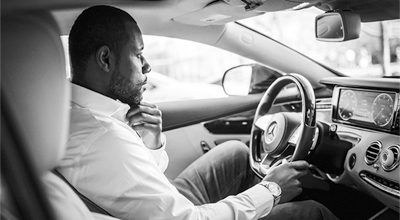Massachusetts Uber Accident Attorneys
Rideshare Risk is on the Rise
Uber, Lyft, or rideshare accidents are becoming more common in Massachusetts. As the popularity of these ridesharing services has increased, so has the number of incidents involving them. A collision during a rideshare can be traumatic, but it doesn’t have to define the rest of your life.
If you or a loved one has been injured in an Uber, Lyft, or rideshare accident, you may be feeling overwhelmed and confused about what to do next. The good news is that you don't have to go through this process alone. The experienced attorneys at Baker Law will be by your side every step of the way.
Rideshare Accidents Are Too Common
If you’ve been injured in an Uber, Lyft, or rideshare accident, you’re not alone. Consider the following numbers related to Uber and Lyft drivers:
25% of Collisions in Boston
Rideshares were involved in a quarter of all motor vehicle collisions in Boston in 2021.+2,250 Collisions
Over 2,250 motor vehicle collisions in Massachusetts during 2021 were rideshares.$1,000,000 Coverage
Uber provides $1,000,000 in 3rd party liability for drivers. Your injury claim should be covered under their insurance.
What Steps Should You Take After an Uber or Lyft Accident?
Taking the right steps — and avoiding missteps — after you’ve been involved in an Uber or Lyft accident is vital. It can make things much easier later on down the road when filing a personal injury claim.
Here are some DOs and DON’Ts following a car accident:
- DO call for emergency medical assistance if needed.
- DO seek treatment from a healthcare professional as soon as possible. This will document any injuries you may have sustained.
- DO gather all available evidence and documentation regarding the other driver, the accident scene, and any damage to the vehicles.
- DO file a Motor Vehicle Crash Operator Report within 5 days if anyone was killed or injured in the accident, or if there is damage in excess of $1,000 to any one vehicle or other property. You MUST do this pursuant to Massachusetts General Laws Chapter 90 Section 26. You MUST also send a copy to the police department with jurisdiction where the crash occurred.
- DO NOT leave the scene, call 9-1-1 for the police. The police will document the accident and a police report will be filed.
- DO NOT speak with any representative of the other driver’s insurance company. Seriously, DO NOT do this. Auto insurance representatives reach out after an accident for a recorded statement. They might seem helpful, but they are looking for ways to lower any potential payout. Politely decline to speak with anyone other than your insurance company. Simply tell them that you are exploring your legal options.
Proving Liability After a Car Crash
To have a compelling case, we must prove the negligence and liability of the collision. The claim for damages must establish four specific elements of negligence for the court.
Duty of Care
Every motorist has a legal duty to use reasonable care when performing any activity that could cause harm to others. They must operate the vehicle in the same manner as any other cautious and sensible person would in the same position.
Breach of Duty of Care
A driver being careless behind the wheel breaches their duty of care. When that happens, the claim meets this element of proving negligence. In bringing your case to court, we try to prove the person that hit you was driving with distractions or failed to follow traffic laws. That would affirm this element of negligence.
Causation
To prove causation, we help you show the negligent driver’s actions were the cause of your injuries. Videos, photos, and witness testimony are all examples of potential evidence to establish this part of negligence.
Damages
The final part of negligence is proving damages, or the compensation owed as a result of the injury. It’s why we request such meticulous records of your situation. Insurance companies want to see all of the details of what has occurred to prove what is owed. Damages are the simplest to prove in personal injury claims. You can show documentation such as medical records, hospital bills, and repair bills.
Reach Out for a Case Evaluation with No Obligation or Fee — Just Advice.
Injured in an Uber or Lyft motor vehicle accident? Contact our law firm — especially before speaking with insurance representatives. Get advice at NO cost and with NO obligation. We can answer your questions and provide direction. If you retain us as your attorneys, we handle all communications and negotiations with insurance companies.
Focus on your family and your health, and we’ll get you the maximum compensation you deserve.
